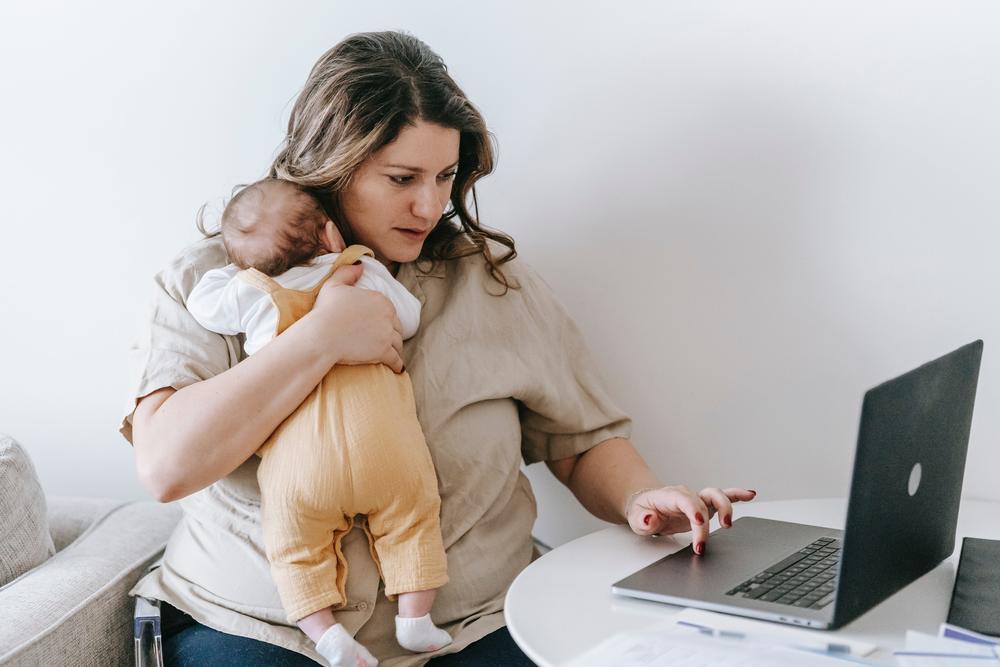
Caption
Many households have two parents working, and Georgia does not have a paid leave law for all employees.
Credit: Pixabay
The Georgia Coalition for Paid Leave says access to parental and sick leave can increase employee engagement and retention, while not having it leads to turnover. GPB’s Ellen Eldridge reports.

Many households have two parents working, and Georgia does not have a paid leave law for all employees.
Support for paid leave is growing across the country because many households have two parents working and caregiving needs are expanding, according to a new report from the Georgia Coalition for Paid Leave and the state chapter of 9to5, National Association of Working Women.
Legislating paid time off is a policy win for families, employees and employers, said Feroza Freeland, the Southern office policy manager for the nonprofit worker advocacy group A Better Balance.
Opponents to policies granting paid leave argue that when an employee goes on leave for a number of weeks, his or her tasks need to be covered by other employees in the business, which can lead to a loss of productivity.
But turnover can cost businesses up to 33% of an employee's salary, according to a 2017 retention report from the Work Institute.
In Georgia, 34% of parents with young children said they or someone in their family had to quit, not take a job or change jobs in the past 12 months due to issues with child care, the Coalition's report found.
RELATED: 1 in 5 Georgians quit jobs to be caregivers during the COVID-19 pandemic. Here's why
According to the U.S. Small Business Administration, Georgia currently has 1.1 million small businesses, which make up 99.6% of all businesses within the Peach State.
That's more than 43% of all Georgia employees — 1.6 million of residents — who are self-employed, independent contractors, family service workers, childcare providers and food truck owners, said Georgia director for Small Business Majority Rachel Shanklin.
"Folks that have less than 10 employees," Shanklin said. "That's who we're talking about here. (Those) who can't necessarily provide or have the financial capacity to offer these benefits."
Paid sick leave can help prevent the spread of infections such as COVID-19, and people who work while sick are often less productive.
"We hope that lawmakers will use this report, see the overwhelming evidence of the benefits of enacting a more robust paid leave program and quickly enact new legislation that will expand the paid leave available to Georgia workers," said Allison Glass, the training and policy manager of 9to5 Georgia.
Glass called current access to paid leave in Georgia "wholly inadequate and inequitable."
"HB 146 gives three weeks, but this makes my blood boil because most day cares won't even accept an infant until they're 6 weeks old," says a Fulton County mother
Less than a quarter of all private sector workers have access to paid leave, and it's even less accessible to low wage workers, she said.
Family medical leave is disproportionately inaccessible to workers of color, including 57.7% of Black workers, 75.7% of Hispanic workers, 54.1% of Asian Pacific Islander workers, 57.4% of Native American Alaska Native workers, and 73% of other multiracial non-Hispanic workers, Glass reported, adding that 57.8% of white workers do not have access to family medical leave.

Paid leave is not available to roughly 60% of Georgians.
The federal Family and Medical Leave Act only provides 12 weeks of unpaid leave, and the majority of Georgians are not eligible because they are newly employed, work for a small business or are employed part time.
Savannah resident Ashley Bostick, who is also a member of 9to5 Georgia, said she lost her job when she took maternity leave because she was a part-time employee who was not covered by FMLA.
"With my second (pregnancy), I had to return to work too soon despite having complications with diabetes," Bostick said.
RELATED: 80% of Georgia voters support an insurance plan for paid leave. This bill would make it happen
Georgia's current law of three weeks paid of parental leave for state and public school employees was enacted last year, but Glass said that a mother of two from Fulton County criticized the length of paid leave.
"HB 146 gives three weeks, but this makes my blood boil because most day cares won't even accept an infant until they're 6 weeks old," the mother told Bostick. "Three weeks is better than no weeks, but it's putting more stress on parents and is not actually helpful."
MORE: With few other resources, people with behavioral health issues find treatment in jails and prisons
Paid leave can also help with Georgia's growing overdose crisis and support those living with substance use disorder, Leah Chan with the Georgia Budget and Policy Institute said, citing an analysis of opioid overdose deaths in Massachusetts that found overdose rates were higher in industries that had lower access to paid sick leave.
"So offering this paid leave can not only help workers successfully take time off to get access to the health care they need, but also benefit employers and the overall health care system by lowering health care costs and lowering the costs associated with employee turnover and loss of productivity as a result of these health conditions," Chan said.
A state-administered paid leave insurance program would help small businesses become more competitive by ensuring that all workers can receive paid family leave regardless of the size of the company in which they work, Shanklin said, adding that publicly-administered programs make it easy and affordable for small business employers to access paid leave as well.
"What's more is that many businesses agree that paid family and medical leave isn't just the right thing to do, but it makes good business sense," she said.
The report's cost benefit and analysis shows that most small employers say taking care of their employees is crucial to retaining a productive and talented workforce, and policies like paid leave enable small businesses to foster a better workforce while protecting their workers and their bottom lines.